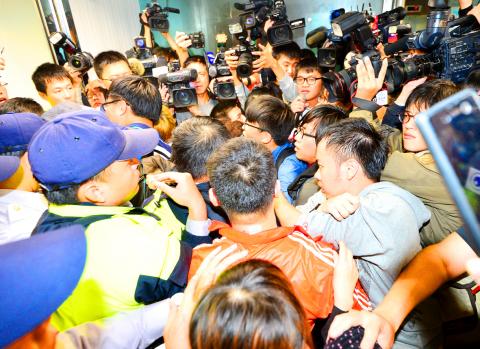Students stormed Democratic Progressive Party (DPP) headquarters in Taipei yesterday, escalating a protest over controversial amendments to the Labor Standards Act (勞動基準法).
About 20 students from groups affiliated with the Workers’ Struggle Alliance scuffled with police guarding the glass doors lead to the DPP’s offices, shouting for President Tsai Ing-wen (蔡英文) to come out and face them over the party’s plan to cut the number of national holidays per year from 19 to 12.
The cuts would be implemented following the passage of a bill that is part of reforms to implement a 40-hour workweek, with a final vote possible as soon as next week after the expiration of a one-month waiting period imposed after cross-caucus negotiations.

Photo: Wang Yi-sung, Taipei Times
Protesters occupied a reception area at the DPP offices shortly after noon, prior to a meeting of the DPP Central Standing Committee, after reportedly failing to force their way down to a lower floor where the meeting was to be held.
They pasted slogans across foyer walls and doors, occasionally shouting slogans in between speeches.
“The main reason [for the occupation] is the response we received from [DPP caucus whip] Ker Chien-ming (柯建銘) yesterday [Tuesday] and the fact that we have protested in front of DPP headquarters many times, but have never received a response,” Taiwan Higher Education Union student action committee member Su Tzu-hsuan (蘇子軒) said.
Ker on Tuesday said he was only willing to discuss the amendments with other legislators, after protesters briefly occupied one of his offices at the Legislative Yuan to demand a public debate.
The protesters also criticized statements by Legislative Speaker Su Jia-chyuan (蘇嘉全), who said Tuesday’s occupation was unacceptable, as a legislator’s office constitutes “private space.”
“If offices were truly ‘private space,’ then Su as legislative speaker should not have issued an official condemnation and the fact that he did not shows that they at least partially belong to the public,” Su Tzu-hsuan said, threatening that the protesters would follow DPP members “like shadows” if they failed to respond.
“We have to draw a line between ourselves and this ‘capitalist’ party that is advancing the interests of the wealthy, meeting secretly with business groups and capitalists, rather than listening to young people,” he said.
The protesters occupied the foyer for about an hour before attempting to stage a retreat, only to be blocked briefly by police officers before they were allowed to quietly trickle into the elevators.
DPP officials reportedly asked the police to refrain from dragging the students out of the building.
Su said the protesters staged a voluntary retreat after it became apparent there was “absolutely no way” that they would meet with Tsai.
DPP spokesman Juan Chao-hsiung (阮昭雄) said the party respected the protesters’ opinions and their right to freedom of expression.
“We respect different opinions and believe these young people have fully expressed theirs,” Juan said when asked why no DPP officials tried to communicate with the protesters.
Tsai did not comment on the protest during the committee meeting, Juan said.
Additional reporting by Chen Wei-han

DAREDEVIL: Honnold said it had always been a dream of his to climb Taipei 101, while a Netflix producer said the skyscraper was ‘a real icon of this country’ US climber Alex Honnold yesterday took on Taiwan’s tallest building, becoming the first person to scale Taipei 101 without a rope, harness or safety net. Hundreds of spectators gathered at the base of the 101-story skyscraper to watch Honnold, 40, embark on his daredevil feat, which was also broadcast live on Netflix. Dressed in a red T-shirt and yellow custom-made climbing shoes, Honnold swiftly moved up the southeast face of the glass and steel building. At one point, he stepped onto a platform midway up to wave down at fans and onlookers who were taking photos. People watching from inside

MAKING WAVES: China’s maritime militia could become a nontraditional threat in war, clogging up shipping lanes to prevent US or Japanese intervention, a report said About 1,900 Chinese ships flying flags of convenience and fishing vessels that participated in China’s military exercises around Taiwan last month and in January last year have been listed for monitoring, Coast Guard Administration (CGA) Deputy Director-General Hsieh Ching-chin (謝慶欽) said yesterday. Following amendments to the Commercial Port Act (商港法) and the Law of Ships (船舶法) last month, the CGA can designate possible berthing areas or deny ports of call for vessels suspected of loitering around areas where undersea cables can be accessed, Oceans Affairs Council Minister Kuan Bi-ling (管碧玲) said. The list of suspected ships, originally 300, had risen to about

A Vietnamese migrant worker yesterday won NT$12 million (US$379,627) on a Lunar New Year scratch card in Kaohsiung as part of Taiwan Lottery Co’s (台灣彩券) “NT$12 Million Grand Fortune” (1200萬大吉利) game. The man was the first top-prize winner of the new game launched on Jan. 6 to mark the Lunar New Year. Three Vietnamese migrant workers visited a Taiwan Lottery shop on Xinyue Street in Kaohsiung’s Gangshan District (崗山), a store representative said. The player bought multiple tickets and, after winning nothing, held the final lottery ticket in one hand and rubbed the store’s statue of the Maitreya Buddha’s belly with the other,

Japan’s strategic alliance with the US would collapse if Tokyo were to turn away from a conflict in Taiwan, Japanese Prime Minister Sanae Takaichi said yesterday, but distanced herself from previous comments that suggested a possible military response in such an event. Takaichi expressed her latest views on a nationally broadcast TV program late on Monday, where an opposition party leader criticized her for igniting tensions with China with the earlier remarks. Ties between Japan and China have sunk to the worst level in years after Takaichi said in November that a hypothetical Chinese attack on Taiwan could bring about a Japanese